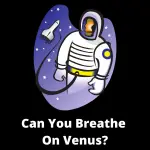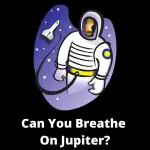No, you cannot breathe on Mars.
In the article that follows, we’ll explain.
Can You Breathe On Mars? (EXPLAINED)
Relevant Facts About Mars
Mars is the 4th closest planet to the sun, after Mercury, Venus, Earth, and Mars.
Mars is a terrestrial planet, which means it has a solid surface unlike Jupiter, Saturn, and Uranus.
Unlike Mercury, Mars has enough gravity to hang onto an atmosphere.
This atmosphere is composed of 95% carbon dioxide, and less than 1% oxygen.
The atmosphere is also less dense than Earth’s atmosphere.
This means that there would be fewer atoms/molecules in a space of any given size.
However, despite having a thin atmosphere, Mars is not considered a vacuum.
Relevant Facts About Human Respiration
The air humans breathe here on Earth is composed of 78% nitrogen and 21% oxygen.
There are also many other gases present in the air, including carbon dioxide, neon, argon, and krypton in small amounts.
Humans are dialed in on this amount of oxygen pretty closely.
If we breath a mix of air that has less oxygen in it, either because of a higher altitude or the mixture has been manipulated, our bodies do not function well at all.
In fact, if the situation of lack of oxygen in the air we breathe is not remedied quickly, we will lose consciousness or die.
Just as a human suffer if there isn’t enough oxygen in the air, a human can also be injured when there is too much.
While you won’t keel over and pass out from breathing in a mixtures of oxygen that is dramatically more than you are used to, over time the excess oxygen can cause damage to the nervous system and other delicate tissues.
Why Can’t Humans Breathe On Mars?
The primary reason humans cannot breath on Mars is that the atmosphere of Mars does not contain the right balance of oxygen to other elements and compounds to sustain human life.
Mars has a thin atmosphere (100x thinner than Earth), and only 1% of it is oxygen.
This is not anywhere close to what a Mars visitor from Earth would need in order to maintain consciousness.
If you were to take your helmet off on Mars and attempt to take a breath, you’d be able to make your lungs take in something.
But that something would be mostly carbon dioxide.
This would probably you to breathe very fast in an attempt to gather more oxygen from the atmosphere, but it would not be enough.
Another thing that would be happening while you tried to breathe is the water in the tissues of your lungs would boil away (due to the lack of atmospheric pressure).
This wouldn’t kill you immediately, but death would result shortly.
Some people would argue that you should try and hold your breath if your helmet came off, or if your suit was punctured.
This is not a good idea, as the change in pressure would likely cause damage to your lungs as the breath you held tried to expand.
If you start to breath Martian air, you’d breath heavily, start to fumble and stumble, maybe vomit, and lose consciousness.
In the end, if you spend more than a few seconds trying to breath Martian air, you’ll die.
Trying to Breath On Mars vs Breathing On Venus
You can’t breath on either Mars or Venus.
But at least if you tried to breathe on Mars, you wouldn’t die immediately.
You could put your helmet back on, retreat into the ship, or find some other way to resume normal breathing operations.
Contrast that with Venus, which gets as hot as 800-900 degrees Fahrenheit, is surrounded by sulfuric acid clouds, and has air so dense that it would crush you and your ship before you could even try to get your helmet off to take a breath.
If you somehow manage to get to Venus, there is probably no going back after taking off your helmet.
Did You Know? (Other Facts About Mars)
Here are some facts you may not have known about Mars:
- Mars isn’t that big! It is actually only about half the size of Earth. However, it is still significantly larger than Pluto, which is only a third of the size of Mars.
- Mars doesn’t have a magnetic field, but there is evidence that Mars may have had one in the distant past.
- While the winds aren’t as turbulent as we see on the gas giants and ice giants, they are significant enough on Mars to whip up massive dust storms that can take months to settle down.
- Mars has two moons, but no rings. Scientists think that Phobos is being pulled in towards Mars, and will eventually either crash into Mars or break up before it gets there. The result could be a set of rings for Mars.
- The first rover sent to Mars was Sojourner and it weighed only 23 pounds. The most recent rover sent to Mars (named Perseverance) weighed more than 2200 pounds.
- The largest volcano in the solar system can be found on Mars.
- Mars is 142 millions miles from the sun.
- Manned missions to Mars are being planned by more than one county sometime in the 2030s. China says it is going in 2033.
Wrap Up
Mars is a fascinating planet, and we look forward to learning more about it as the progress of space exploration continues.
You might also enjoy:
- USVAO Mars Articles Library
- Can You Walk On Mars?
- Can You Breathe On Mercury?
- Can You Breathe On Venus?
- Can You Breathe On Jupiter?






